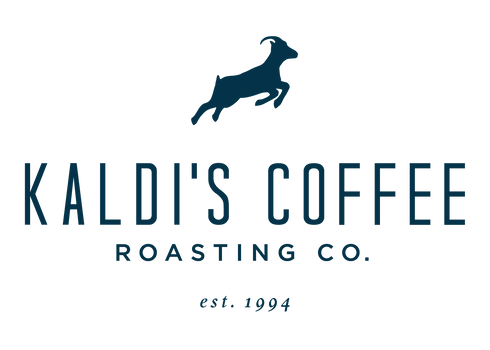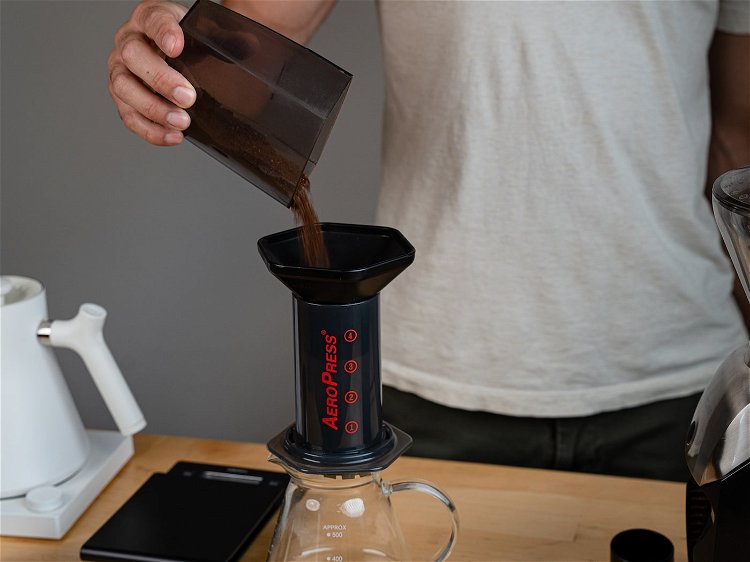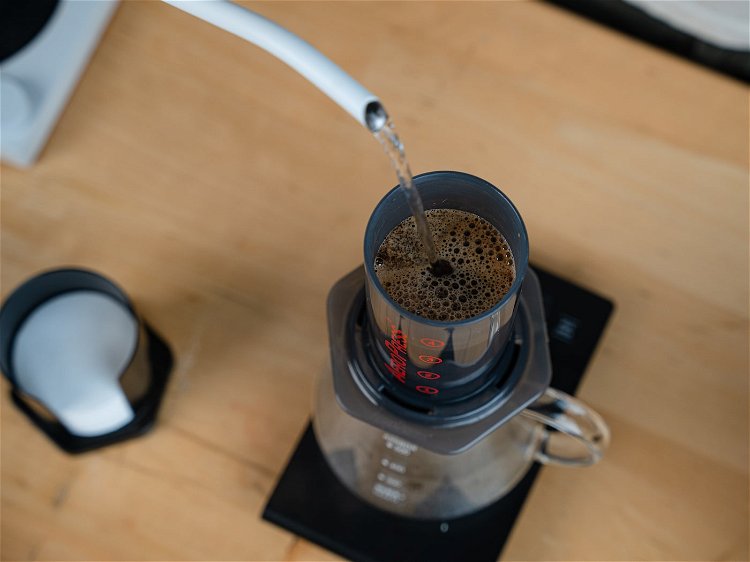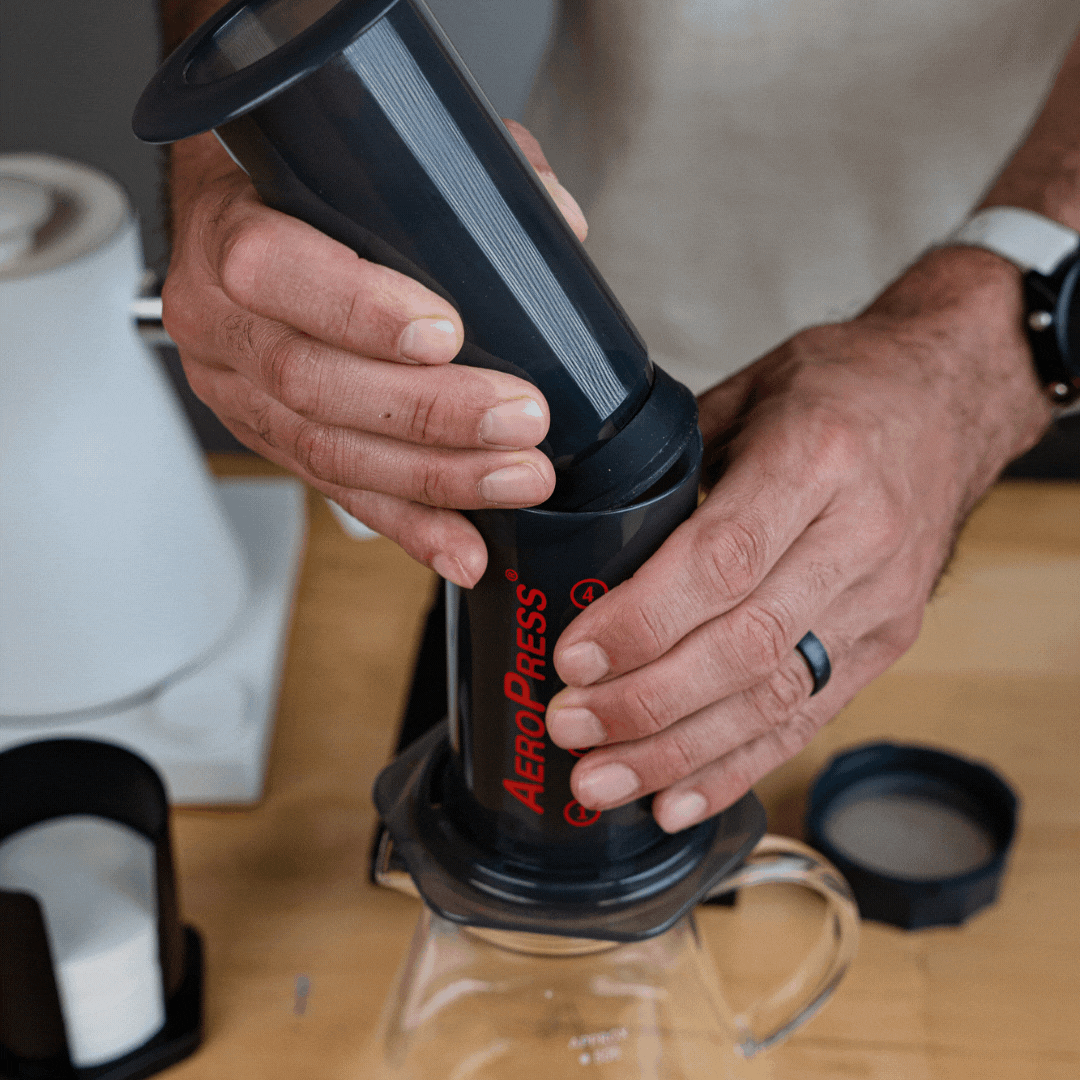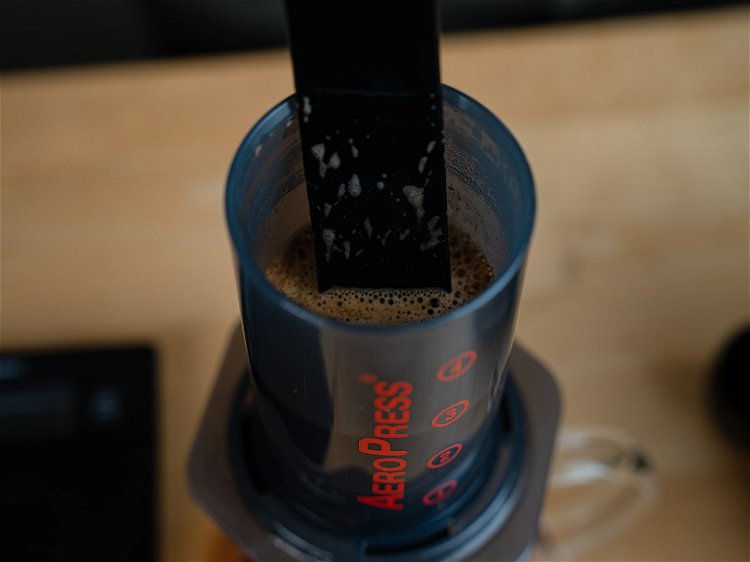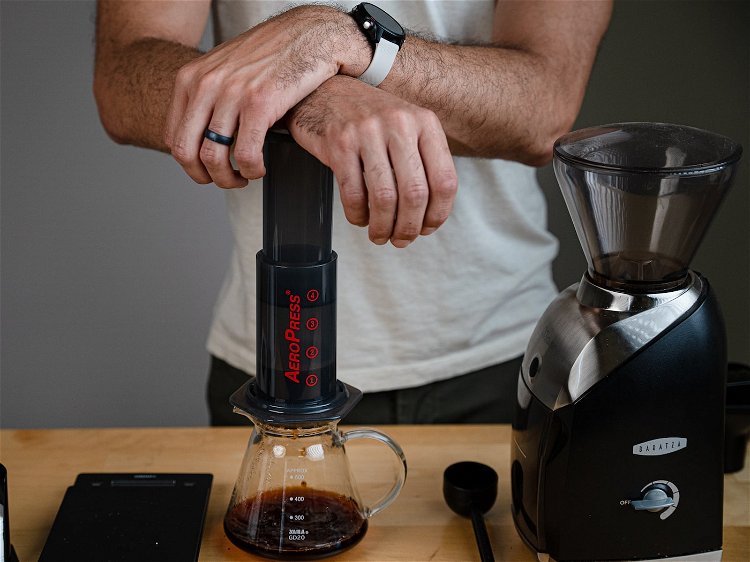DON'T MISS OUR FULL VIDEO ON YOUTUBE:
OR WATCH OUR YOUTUBE SHORT AT THE BOTTOM OF THIS PAGE.
Click here to skip to the recipe
Perhaps only in coffee can something so weird become something so ubiquitous and loved.
Welcome to the Aeropress.
In this blog, we pay homage to the wonderful world of Aeropressing. It's versatile, fun, travel-ready, and, most importantly, makes great coffee. Please join us as we discuss:
- What is the Aeropress?
- Who is the Aeropress for?
- Why we're revisiting the Aeropress
- How did we come to our Aeropress recipe?
- Our final recipe for a clean, consistent cup
Click any link to skip to that section and get our final recipe at the very bottom. Let's get started!

WHAT IS THE AEROPRESS?
First, a simple breakdown of the Aeropress and some of its qualities:
Taking a step out of our specialty coffee bubble for a second and looking at this brewer with fresh, unaccustomed eyes, we have to admit - this thing is odd. It's a long tube... with a piston? And an odd shaped... paddle-like thing? And what are those numbers on the side? What is this funnel-thing with a huge hole even for?

If you've never seen the Aeropress before or ever tried to gift one to someone, you are probably familiar with this reaction. It's no Mr. Coffee brewer. It's no objectively beautiful Chemex. It looks oddly scientific, maybe a little intimidating, and perhaps wildly over-engineered for those who don't see why a cup of coffee is worth all this fuss.
But those that dive in tend to fall in love and each of its components makes more and more sense.
WHO IS THE AEROPRESS FOR?
Again, it's strange to say this for a brewer that can appear so weird, but we really think the Aeropress is for every kind of coffee lover. You can find it as some people's only manual coffee brewer, or one of 20 coffee brewers in a hobbyist's collection.
How can that be so?
For The Coffee Newbie: Forgiving and Simple
For someone new to coffee brewing, the Aeropress is a very attractive brewer because it is so forgiving and has a low barrier to entry. From this writer's experience, it was the first coffee brewer where I said to myself, "hey, I can make a good cup of coffee!". Furthermore, the process doesn't require other major purchases — like a gooseneck kettle — to get a really good tasting cup. A tea kettle or even a Pyrex measuring glass can do the trick. The same cannot be said for a pour over brewer like the V60.
Once you understand the basics of brewing, and what each of the many pieces does, brewing is a breeze, clean up is easy, and the effort to enjoyment ratio just feels right.
For The Coffee Brewing Guru (Brew-ru?): Versatile and Experimental
Once you've locked in your techniques and invested in excellent prosumer gear, brewing can sometimes feel a bit... mundane. This is where the Aeropress's versatility shines.
New recipes are coming out all the time. One of the latest trends in coffee is something call no-bypass brewing. In simple terms, it means that all water used for brewing goes through the coffee and none of it "sneaks out" via other pathways. It's kind of amazing that you can do this in an Aeropress, even though this concept didn't really exist when it came out.
Then, there are 10 minute recipes that simultaneously maximize extraction and challenge everything you thought about coffee brewing (we've tried it and it's pretty shocking how good it is). Finally, there are "espresso-like" recipes that give you something short and strong (some are VERY strong), and other recipes that use cold water.
All that said, if you're seeking something different, the Aeropress can probably do it. It can serve as a great way to get a new "look" at any coffee you are brewing and breathe new life into it.
For The Traveler: Lightweight and Durable
On the go? Want nothing to do with hotel coffee? Need something that's great for the campsite? Aeropress, Aeropress, Aeropress. It's plastic construction makes it (relatively) unbreakable and lightweight and its aforementioned low barrier to entry means you don't need a ton of extra gear to make it work. There are many manual grinders that have been specifically designed to fit inside the piston as well, such as the Aergrind and the 1ZPresso Q2, that make traveling even more convenient.
No matter who you are, all it takes is a little patience and understanding and you're on your way to something great.
WHY WE'RE REEXAMINING THE AEROPRESS
It's been a while since we last wrote about the Aeropress, and since that time a lot has happened in the world of Aeropressing. Experiments have been done, theories have been tested, and a plethora of videos have been made all detailing the versatility and quality of this nifty little brewer. There are more recipes out there than any one person can truly toy with, nevertheless adopt.
So, we put our Kalitas and Chemexes back in the cabinet for a while and went to work on an updated guide for the Aeropress. And, frankly, we had a ton of fun doing it, because it's maybe the most fun brewer on the market, even after all these years.

HOW WE CAME TO OUR AEROPRESS RECIPE
We knew we wanted our final Aeropress recipe to have some specific qualities:
- Makes 1 good size cup (roughly 8 oz)
- Simple for anyone of any skill level
- Results in a "clean" profile
- Works for a wide variety of coffees
As we tested, we landed on a few conclusions about brewing:
1. No "bloom"
The purpose of a bloom in pour over is to help remove CO2 gas in the coffee that can cause bubbles and dry pockets, plus get the coffee bed fully saturated for more even extraction. Full immersion — like with the Aeropress — doesn't suffer from these same pitfalls because the coffee grounds are literally in contact with all of the water all the time. We achieve even saturation via the swirl and stir at the beginning and then immediately pouring in all of the remaining water.
2. More time in full immersion leads to more sweetness
The full immersion process — like with the French Press or a coffee cupping — is extremely forgiving and draws a lot of sweetness out of a coffee. The longer the brew time, the better the perception of sweetness with little risk of over-extraction, especially if you do the next finding.
|
Also a lover of the French Press?
Click Here to See our French Press Recipe + Video!
|
3. A slow press leads to a cleaner, higher clarity cup
We'll be frank: you probably can't get the clarity of a V60 or a Chemex in a Aeropress. But, you can still get good clarity, and we achieved this with a very slow press at the end. We found muddier flavors — and even a muddier looking cup — with a hard press, which more than likely results from the increase in agitation and pressure.

4. The "standard", i.e. non-inverted method makes a great cup and leaves more room to make a bigger cup of coffee
The inverted method involves putting the plunger in the top of the brewer and flipping the brewer over. This prevents any coffee or water leaking out of the cap during the steeping phase. However, it also limits the size of cup you can make, and we didn't find that it led to any better taste. So, we stuck with the standard as laid out below. Doing this adds a few more time-sensitive steps, but it can also prevent some Aeropress disasters that come along with the inverted method!
|
CLICK HERE TO GO TO COFFEE BREWING BLOGS
|
LET'S BREW WITH THE AEROPRESS!
Enough with the talk, let's start brewing!
